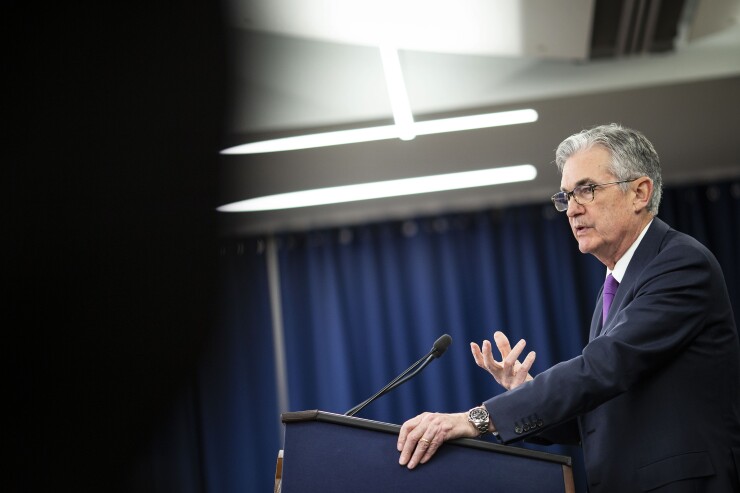WASHINGTON — Federal Reserve Chairman Jerome Powell said Wednesday that the central bank is monitoring the United Kingdom’s continuing efforts to leave the European Union and a messy breakup could pose risks to both the economy and financial system.
Speaking at a press conference capping the most recent meeting of the Federal Open Market Committee, Powell said the apparent lack of a deal in Brexit negotiations regarding the
“We’ve been monitoring the Brexit situation very carefully for a long time, and for us, that starts with U.S. financial institutions that have a presence either in the U.K., the EU or both,” Powell said. “We have worked with those institutions, along with U.K. and EU regulators, to assure ourselves that those firms have plans and have liquidity and have all the things that they will need for the full range of Brexit outcomes.”

Powell also signaled that the Fed is "open" to the idea of fintech firms obtaining a special-purpose bank charter from the Office of the Comptroller of the Currency, but declined to offer any more detail about the central bank's thinking about the charter. The Fed is poised to decide if such banks have access to the payments system.
Powell also confirmed that the central bank still views the payment of interest in excess reserves, or IOER, as an appropriate monetary policy tool.
On Brexit, the Fed chairman said the risk of the U.K. leaving the EU without agreements in place is economic, in part, because it would likely result in slowed growth in both the eurozone and the U.K. But the greater risk, he said, would be if there is a disruption to the international financial markets.
“If there is a hard Brexit, that will very likely involve disruptions both to the continental economy and certainly to the U.K. economy, and we would feel that,” Powell said. “It wouldn’t be a huge first-order thing, the economic effects, unless you saw financial disruption. If you saw financial turmoil and that kind of thing — that would be the way it would reach us.”
The British Parliament overwhelmingly rejected Prime Minister Theresa May’s deal with the EU earlier this month, heightening the possibility that the U.K. could run against a deadline to leave the EU without a comprehensive trade deal. Of particular interest to banks is the status of both future and existing
When asked about the OCC's fintech charter, Powell declined to say definitively whether the central bank has any opinion about the new licensing option. Potential fintech charter applicants are
“Those are great questions and questions that our great supervisory people are looking at,” Powell said. “I think we're open to these ideas, but I don’t have any news for you on that today.”
Powell announced last year that there would be press conferences after each FOMC meeting — meaning a higher frequency of his appearances than before — in an effort to increase transparency. Wednesday’s press conference is the first such press conference that would not otherwise have been scheduled.
The FOMC's statement marked the most explicit determination to date that the committee does not intend to abandon IOER, as its primary monetary policy tool. The practice of paying interest on excess reserves dates to the onset of the financial crisis. It was implemented because the Fed’s previous monetary policy tool — buying and selling Treasurys — was not possible with markets frozen and interest rates dropping to almost zero.
Under IOER, the Fed implements its target interest rate by paying a certain rate to banks for their balances held in Fed accounts. That rate then acts as a kind of minimum return that banks can earn on their capital. The difference between the federal funds rate and the overnight repurchase agreement interest rate is effectively the target window for federal funds.
The practice has been controversial among certain economists, who argue that IOER is designed to act as a ceiling for prevailing interest rates rather than as a floor, and as constructed amounts to a giveaway to banks that is not available to other financial intermediaries. Fed officials, meanwhile, have defended the practice as a more effective and reliable way of implementing its monetary policy goals and in line with what central banks all over the world use.
Powell had previously
“The FOMC strongly believes that this approach provides good control of short-term money-market rates in a variety of market conditions and effective transmission of those rates to broader financial conditions,” Powell said. “Settling this central question clears the way for the FOMC to address a number of further questions regarding the remaining stages of balance sheet normalization.”





